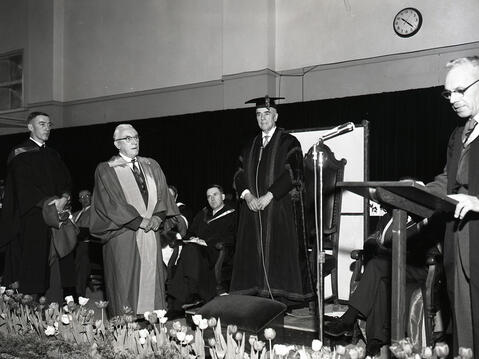
Zone du titre et de la mention de responsabilité
Titre propre
Honourary Degrees - Presentation - M.J. Coldwell
Dénomination générale des documents
- Document graphique
Titre parallèle
Compléments du titre
Mentions de responsabilité du titre
Notes du titre
Niveau de description
Pièce
Cote
Zone de l'édition
Mention d'édition
Mentions de responsabilité relatives à l'édition
Zone des précisions relatives à la catégorie de documents
Mention d'échelle (cartographique)
Mention de projection (cartographique)
Mention des coordonnées (cartographiques)
Mention d'échelle (architecturale)
Juridiction responsable et dénomination (philatélique)
Zone des dates de production
Date(s)
-
12 May 1961 (Production)
Zone de description matérielle
Description matérielle
1 negative : b&w ; 10 x 12.5 cm
Zone de la collection
Titre propre de la collection
Titres parallèles de la collection
Compléments du titre de la collection
Mention de responsabilité relative à la collection
Numérotation à l'intérieur de la collection
Note sur la collection
Zone de la description archivistique
Nom du producteur
Historique de la conservation
Portée et contenu
Rupert D. Ramsay, Director of Extension, speaks from podium as M.J. Coldwell, honourary Doctor of Laws degree recipient, awaits presentation of degree by F. Hedley Auld, University Chancellor during Convocation held in Physical Education gymnasium. Norman K. Cram, University Registrar, standing at far left.
Bio/Historical Note: Major James William Coldwell, usually known as M. J. Coldwell, was born in 1888 in Seaton, Devon, England. He immigrated to Canada in 1910. Prior to his political career, he had been an educator and union activist. In 1935 he was elected to the House of Commons, representing the Rosetown-Biggar electoral district. He was re-elected five more times before he was defeated in the 1958 Diefenbaker sweep. He was the CCF's first national secretary in 1934 and became its national leader upon the death of J.S. Woodsworth in 1942. He remained as its leader until 1960, when there was a parliamentary caucus revolt against him. When the CCF was disbanded 1961, he joined its successor party, the NDP. He is remembered mainly for helping to introduce "welfare state" policies to Canada, by persuading the Canadian government to introduce an Old Age Security program, and child benefits during the mid-1940s. Coldwell turned down several offers to cross the floor and join the governing Liberal Party of Canada, including one offer that eventually would have made him the Prime Minister of Canada. After his defeat in 1958, he was offered a Senate appointment but declined it as well. He became a member of the Privy Council in 1964 and in 1967 became one of the initial inductees into the Order of Canada. Colwell died in Ottawa in 1974.
Zone des notes
État de conservation
Source immédiate d'acquisition
Classement
Langue des documents
Écriture des documents
Localisation des originaux
Disponibilité d'autres formats
Restrictions d'accès
Délais d'utilisation, de reproduction et de publication
Photographer: Gibson
Other terms: Copyright: University of Saskatchewan

